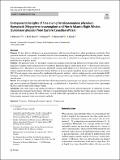Files in this item
Endoparasitic insights of free-living fin (Balaenoptera physalus), Humpback (Megaptera novaeangliae) and North Atlantic Right Whales (Eubalaena glacialis) from Eastern Canadian Waters
Item metadata
| dc.contributor.author | Kleinertz, S. | |
| dc.contributor.author | Silva, L. M. R. | |
| dc.contributor.author | Köpper, S. | |
| dc.contributor.author | Hermosilla, C. | |
| dc.contributor.author | Ramp, C. | |
| dc.date.accessioned | 2021-06-08T14:30:11Z | |
| dc.date.available | 2021-06-08T14:30:11Z | |
| dc.date.issued | 2021-06 | |
| dc.identifier | 274543743 | |
| dc.identifier | c9004901-8064-4e90-b333-785d387a4861 | |
| dc.identifier | 85094657131 | |
| dc.identifier | 000583098600002 | |
| dc.identifier.citation | Kleinertz , S , Silva , L M R , Köpper , S , Hermosilla , C & Ramp , C 2021 , ' Endoparasitic insights of free-living fin ( Balaenoptera physalus ), Humpback ( Megaptera novaeangliae ) and North Atlantic Right Whales ( Eubalaena glacialis ) from Eastern Canadian Waters ' , Acta Parasitologica , vol. 66 , no. 2 , pp. 682-686 . https://doi.org/10.1007/s11686-020-00298-9 | en |
| dc.identifier.issn | 1230-2821 | |
| dc.identifier.other | Jisc: 47164d000e9940e987abcc05c42c15c3 | |
| dc.identifier.other | publisher-id: s11686-020-00298-9 | |
| dc.identifier.other | manuscript: 298 | |
| dc.identifier.uri | https://hdl.handle.net/10023/23335 | |
| dc.description | Open Access funding enabled and organized by Projekt DEAL. | en |
| dc.description.abstract | Purpose: To date, little is still known on parasite infections affecting free-living large whale populations worldwide. Data presented should be considered as a baseline study for future monitoring surveys on endoparasites affecting whales, thereby enhancing investigations on impacts of zoonotic parasitoses not only on vulnerable or endangered baleen whale population health but also on public health. Methods: The presented study is a first report on gastrointestinal parasites infecting different free-living baleen whales inhabiting East Canadian waters using non-invasive methods. Individual faecal samples from fin (n = 3; Balaenoptera physalus), humpback (n = 4; Megaptera novaeangliae) and North Atlantic right whales (n = 1; Eubalaena glacialis) were collected without animal disturbance, within their natural habitats on an ecological expedition during annual surveys in summer 2017. Faecal samples were assessed by standardized diagnostic methods, such as sodium acetate acetic formalin (SAF) technique, carbol fuchsin-stained faecal smears, Giardia/Cryptosporidium coproantigen ELISAs and were applied for further identification. Results: Parasitological infections included three different potentially zoonotic parasite species, one protozoa (Entamoeba spp.) and two metazoans (Diphyllobothriidae gen. sp., Ascaridida indet.). No positive Giardia/Cryptosporidium coproantigen ELISA could be found in the studied whales. Conclusion: This study adds to the current knowledge of intestinal and zoonotic parasite infections of vulnerable to partly endangered free-ranging baleen whales. Only few or no parasitological studies exist for these whale species, usually dealing with only one dead specimen. We call for more research in this field especially for the importance of conservation of free-living marine mammals using non-invasive methods. | |
| dc.format.extent | 5 | |
| dc.format.extent | 1024971 | |
| dc.language.iso | eng | |
| dc.relation.ispartof | Acta Parasitologica | en |
| dc.subject | Zoonoses | en |
| dc.subject | Endangered mammal species | en |
| dc.subject | Conservation | en |
| dc.subject | QH301 Biology | en |
| dc.subject | QL Zoology | en |
| dc.subject | RA0421 Public health. Hygiene. Preventive Medicine | en |
| dc.subject | T-NDAS | en |
| dc.subject | SDG 3 - Good Health and Well-being | en |
| dc.subject | SDG 14 - Life Below Water | en |
| dc.subject | NIS | en |
| dc.subject.lcc | QH301 | en |
| dc.subject.lcc | QL | en |
| dc.subject.lcc | RA0421 | en |
| dc.title | Endoparasitic insights of free-living fin (Balaenoptera physalus), Humpback (Megaptera novaeangliae) and North Atlantic Right Whales (Eubalaena glacialis) from Eastern Canadian Waters | en |
| dc.type | Journal article | en |
| dc.contributor.institution | University of St Andrews. School of Biology | en |
| dc.identifier.doi | 10.1007/s11686-020-00298-9 | |
| dc.description.status | Peer reviewed | en |
This item appears in the following Collection(s)
Items in the St Andrews Research Repository are protected by copyright, with all rights reserved, unless otherwise indicated.

